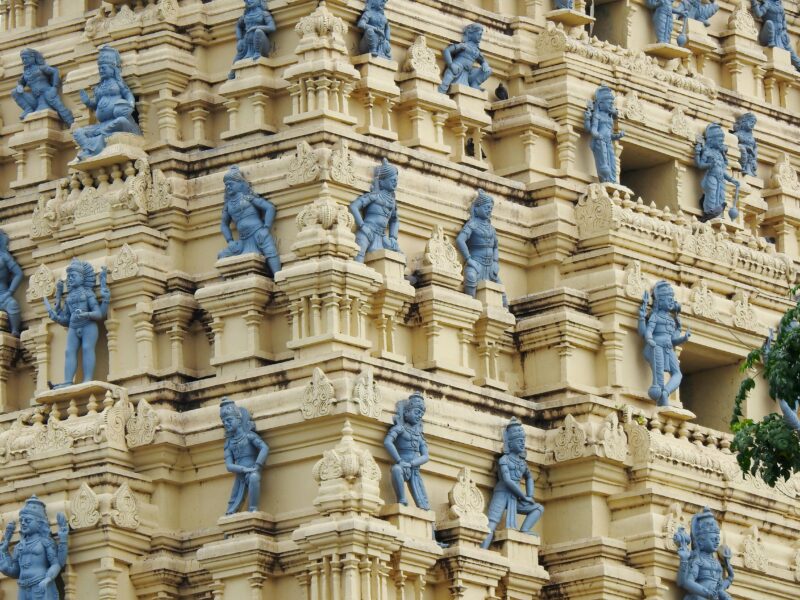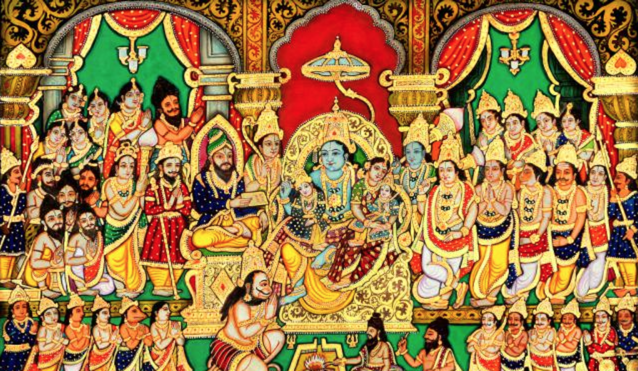Some people are confused about the concept of God in sanātana dharma, or the eternal way of life. They think that there are many Gods, such as Kṛṣṇa, Śiva, Durgā, Brahma, and others. This confusion has made some of the modern youth turn away from spirituality. However, according to the Vedic tradition, there is only one supreme God, and He is Kṛṣṇa. The other deities are demigods, who are subordinate to Him. They are not Bhagavān, the supreme controller.
The confusion arises from the misinterpretation of the Vedas and the Purāṇas, the ancient scriptures of sanātana dharma. The Vedas clearly state that only Viṣṇu and Kṛṣṇa are Bhagavān, and they are the same person. The Purāṇas also use the word Bhagavān in a broad sense, depending on the context. For example, Śiva is called Bhagavān, īśvara, and maheśvara because he is the controller of this universe. Viṣṇu and Kṛṣṇa are called Bhagavān because they control both the material and the spiritualworlds. Brahma controls only the fourteen planetary systems. Brahma, Śiva, and Kṛṣṇa are all īśvaras, or controllers, but there is a difference. Brahma is called īśvara, Śiva is called maheśvara, and Kṛṣṇa is called parameśvara. Kṛṣṇa is the supreme controller of all other controllers.
There is no contradiction in the Purāṇas. They use the word Bhagavān in a literal sense, meaning the supreme controller. One can be supreme at various levels, so the word Bhagavān can refer to different deities in different situations. However, the Vedas accept only one God, who is the source of everything.
Om tad visnoh paramam padam sada pasyanti surayah (Rg Veda 1.22.20).
The Kṛṣṇa Upaniṣad, a part of the Ṛg Veda, clearly states that Kṛṣṇa is Bhagavān:
om kṛṣṇo vai sacit-ananda kṛṣṇa aˉdi-puruṣam ̇kṛṣṇaḥ puruṣottamah
Kṛṣṇa is the eternal, blissful, and conscious person, the original and the best of all persons.
The Gopāla-tāpanī Upaniṣad, the Kaṭha Upaniṣad, and the Chāndogya Upaniṣad also state that Kṛṣṇa is Bhagavān.
In the Bhagavad-gītā, (7.7) Kṛṣṇa says that there is nothing to be known beyond Him
mattaḥ parataraṁ nānyat
kiñcid asti dhanañ-jaya
mayi sarvam idaṁ protaṁ
sūtre maṇi-gaṇā iva
Brahma states that Kṛṣṇa is the original Nārāyaṇa in the Śrīmad-Bhāgavatam:10.14.14
nārāyaṇas tvaṁ na hi sarva-dehinām
ātmāsy adhīśākhila-loka-sākṣī
nārāyaṇo ’ṅgaṁ nara-bhū-jalāyanāt
tac cāpi satyaṁ na tavaiva māyā
There is no confusion in sanātana dharma about who Bhagavān is. It is the ignorant people who spread wrong information. Everywhere in the Vedas, the Purāṇas, and the Itihāsas, Lord Hari is glorified:
vede rāmāyaṇe caiva purāṇe bhārate tathā ādāv ante ca madhye ca hariḥ sarvatra gīyate.
However, it is not enough to know that Kṛṣṇa is Bhagavān. One should also know His qualities, desires, and activities to understand Him. Knowing Bhagavān’s desires is very important. More than that, it is more important to understand what He desires from us. Only then can one follow one’s dharma properly. Otherwise, one follows what one’s mind dictates (manodharma).
Conclusion
In conclusion, sanātana dharma teaches that there is only one supreme God, who is Kṛṣṇa. He is the source and the controller of everything. The other deities are demigods, who serve Him and have limited powers. The Vedas and the Purāṇas use the word Bhagavān in different ways, depending on the context. However, they all agree that Kṛṣṇa is the ultimate Bhagavān, who is worshiped by all the demigods. To understand Him, one should not only know His identity, but also His qualities, desires, and activities. One should also follow His instructions and do what He wants from us. This is the essence of sanātana dharma, the eternal way of life.









